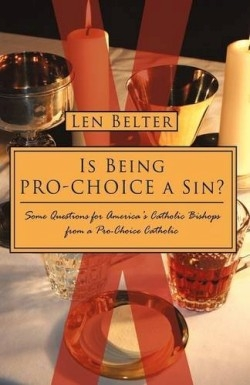Is Being Pro-Choice a Sin?
Some Questions for America's Catholic Bishops from a Pro-Choice Catholic
Recent news reports indicate that bishops of the Roman Catholic Church have asked certain parishioners, either holding or seeking public office, to cease their support of extant abortion law. The message suggests that those who fail to comply may be denied the privilege of receiving communion. While running for political office in Virginia, author Leonard Belter’s wife received a similar request, causing him to consider how the couple’s pro-choice beliefs differ from their church’s official edicts.
In Is Being Pro-Choice a Sin? Belter directs his questions specifically to Catholic bishops in the United States. He presents evidence to illustrate inconsistencies he believes exist in certain Catholic documents. Questioning the church’s modern-day position that the life of a fetus begins at the moment of conception leads him to explore how Catholic doctrine has evolved over past centuries. The book reviews the history of sectarian and secular beliefs about abortion, long accepted abortion practices, legalization of the procedure in the United States in the twentieth century, and current efforts to modify or even repeal that law.
A graduate of Columbia law school, Belter served in the United States Marine Corps and worked as a federal prosecutor. He has recently retired after a long career as partner in a law firm. Belter believes that examination of contemporary documents stating the church’s views on abortion should include not only teachings about the morality of sustaining conceived life, but guidance about church followers’ civic duties related to the subject. “Both aspects are necessary in order to appreciate the dilemma faced by Catholic voters and politicians who are in the ‘personally opposed but’ position regarding abortion,” the author explains.
A 2007 church document titled Faithful Citizenship states that previous advice from bishops was intended to explain to parishioners how to exercise conscience regarding abortion but not how to vote. The author found a contradiction to this statement within the same document. He says, “It goes on to assert that some actions are ‘intrinsically evil’ and can never be allowed. Prime examples are abortion and euthanasia.”
Those Catholics who support the majority position for legalized abortion do so because they don’t want to endorse criminal sanctions should abortion become illegal again and subject to harsh punishment. They disagree with the church’s belief that taking this position infers direct cooperation with individual acts of abortion. Belter writes, “Thus you can be a supporter of the majority position and also personally believe no woman should ever have an abortion.”
The author demonstrates an extensive knowledge of federal law and Catholic doctrine, and he writes well, making good use of legal and sectarian language. However, less attentive readers may get lost in the complex nature of this type of narrative. Such a book may also fail to pique the interest of non-Catholics. But anyone who seeks to understand this controversial issue better, regardless of their opinions about abortion, would benefit from reading it.
Disclosure: This article is not an endorsement, but a review. The publisher of this book provided free copies of the book and paid a small fee to have their book reviewed by a professional reviewer. Foreword Reviews and Clarion Reviews make no guarantee that the publisher will receive a positive review. Foreword Magazine, Inc. is disclosing this in accordance with the Federal Trade Commission’s 16 CFR, Part 255.

